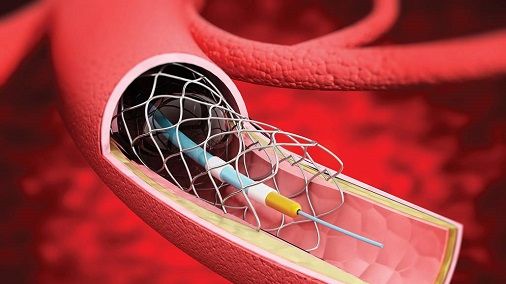
Press release -
Game-Changing Procedure for Stroke Expands to Help Save Lives and Reduce Disability
A new, pilot mechanical thrombectomy service for stroke patients in the East of Scotland has been launched today. The service will be based at the Royal Infirmary of Edinburgh and is set to benefit hundreds of people who have been struck with a life-threatening stroke.
John Watson, Associate Director of the Stroke Association in Scotland said:
“This service is long awaited, overdue, but very welcome indeed.
Thrombectomy is a remarkable procedure. It involves inserting a long tube into an artery in the leg, which is then fed through the body to reach the blood clot in the brain. The blood clot is then captured in a mesh and pulled out. The removal of the clot allows blood flow to resume and oxygen to reach the brain, halting the damaging effects of the stroke. These are blood clots which are too big to be broken down by clot-busting drugs and are usually associated with severe strokes and the worst outcomes for patients.
Around one in every three people who receive a thrombectomy following their stroke will be less disabled as a result. Around one in five will be able to function completely independently afterwards.
Thrombectomy has the power to save lives and reduce disability for around one in every ten people who have a stroke.
The Edinburgh-based pilot is an important milestone on the road to a national 24/7 thrombectomy service for Scotland. A pilot service for the North of Scotland based in Dundee, has been underway since November last year, and we look forward to a third thrombectomy centre in Glasgow coming online next year.”
In addition to improving quality of life, thrombectomy generates substantial savings for the NHS by reducing the need for other interventions or care in the future. Research indicates that, on average, every thrombectomy procedure saves the NHS £47, 000 over a 5-year period.
A stroke is a brain attack. The effects can be devastating. Stroke is a leading cause of severe adult disability. Almost two thirds of survivors leave hospital with a disability. Many have problems with speech and communication, thinking and vision. It can also affect peoples’ emotions and personality.
Alison Maclean, 72, from Dundee had her stroke just before lockdown in January 2020. It was a massive stroke that could have taken away her independence, but following a thrombectomy, she regained full function and has gone back to the life she had before her stroke, almost unchanged.
She said:
“I am back to doing all the things I did before my stroke: seeing friends and family, reading, watching telly, going on my exercise bike and for walks.” See additional attachment for full story.
John continued:
“We want all eligible patients to have access to this game-changing treatment, as quickly as possible. But thrombectomy cannot deliver in isolation. It needs to be part of a new, re-shaped service covering the whole pathway from 999 call, to hospital treatment, recovery and rehabilitation.
The Scottish Government recognises the need for stroke improvements, which is extremely encouraging. It already has a draft framework of what its own advisors, stroke clinicians and the wider stroke community including the Stroke Association want to see. This is the result of good work by all involved.
We look forward to seeing the final report and recommendations at the end of the year. But of course, it is the delivery of change and improvement that really matters so we look forward even more, to a commitment early next year to publish a plan to deliver on it.”
Topics
- Stroke strikes every five minutes in the UK and it changes lives in an instant.
- The Stroke Association is a charity working across the UK to support people to rebuild their lives after stroke. We believe that everyone deserves to live the best life they can after stroke. From local support services and groups, to online information and support, anyone affected by stroke can visit stroke.org.uk or call our dedicated Stroke Helpline on 0303 3033 100 to find out about support available locally.
- Our specialist support, research and campaigning are only possible with the courage and determination of the stroke community and the generosity of our supporters. With more donations and support, we can help rebuild even more lives.
- You can follow us on Twitter, Facebook and Instagram.











